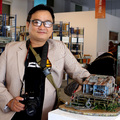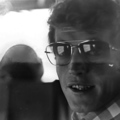“We wore American uniforms, but we spoke in Hungarian…”
Interview with Dr. Eugene Megyesy
I happened to have the opportunity to interview another Hungarian-American veteran. This is always very interesting, as apart from the war, we also talk about the experiences of a well travelled fellow citizen. Dr. Eugene Megyesy was born in 1945, and like many of his peers, left the country after the 1956 Revolution. After a few years in Austria, he settled down in the United States. He had to suspend his university studies to go to Vietnam, and finally graduated after his service years. Afterwards, he worked as a lawyer for decades and had an active role in NGOs and charity organizations. From 2010 he was Senior Advisor to the Prime Minister of Hungary dealing with North American issues and the Hungarian Diaspora for eight years. He was also a member of the board of Friends of Hungary Foundation, the Democracy Center and the 1956 Memorial Committee.
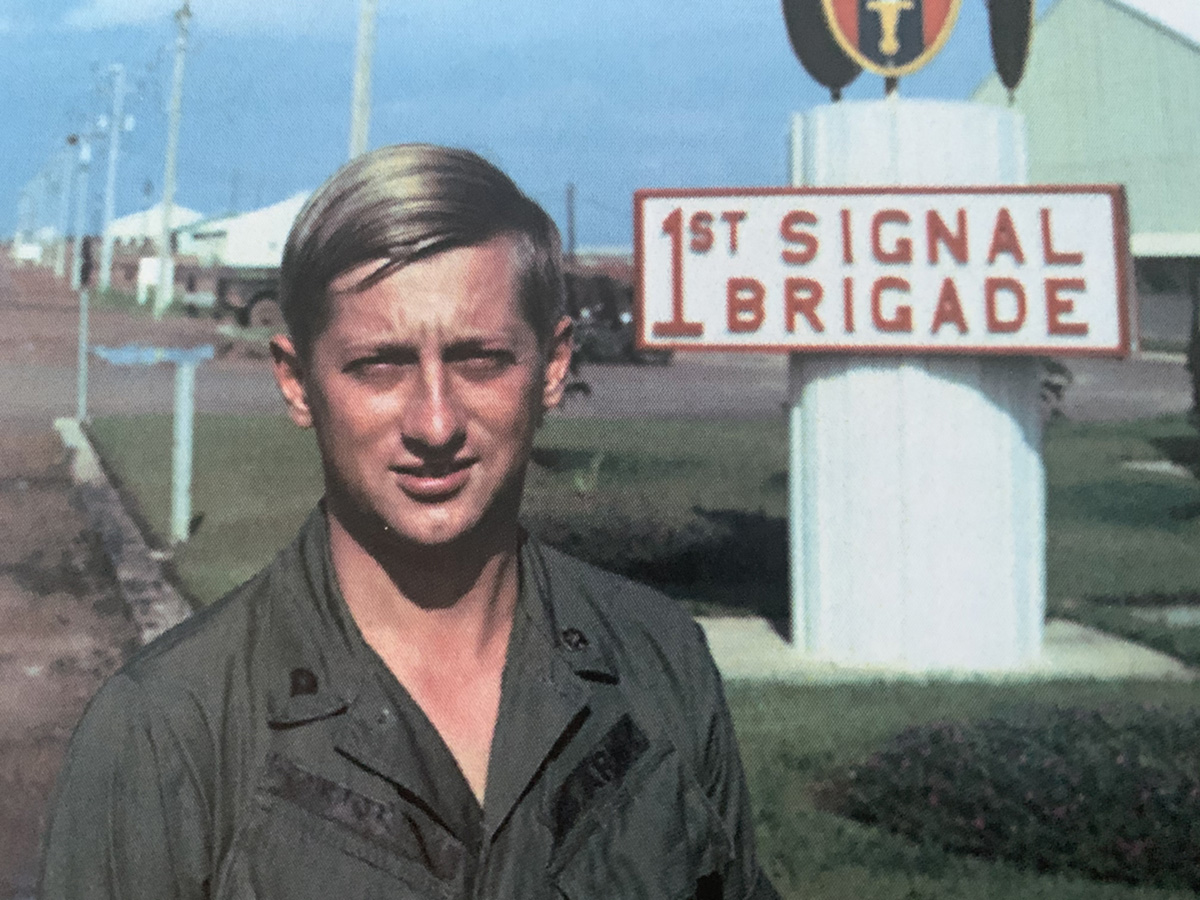
Eugene Megyesy at Long Binh post
Why did you have to leave Hungary in 1956? How difficult was settling down the US?
My father was a lawyer, but he was not allowed to practice under the Communist regime. My grandfather was a judge, but he was forcibly retired. Between 1950 and 1956 we lived in Rácalmás. My dad was elected the president of the Workers’ Committee during the Revolution. When it was over, we tried to get across to Austria, but at first, we did not succeed. Then, in mid-December at dawn, someone knocked on our door. We thought that my dad was about to be arrested. But it turned out that, it was a taxi driver sent by a friend of my father. This friend found out that, my father’s name had appeared on a list that was highly “unhealthy”. He was going to be arrested, but this driver warned us, then took us to Budapest.
We said goodbye to my grandparents, and took a train to Hegyeshalom, on the western border. It was only my family, my parents and my sister. Dad had been there earlier and found a man willing to help us get through. This was key, as several people were trying to get across, but many of them lost their way only to get back to Hungarian territory and to be caught. So we walked for a few hours in single file, evading sentry posts, dog patrols, and finally reached the border. My father and the guide toasted with brandy on the raked no-man’s land and the guide showed us the village lights in the distance, which was Nickelsdorf, Austria. The lights were close to the police station, where we went in, then they took us to a camp, then another camp the next day. We had a relative in Vienna and we stayed in their flat for a few weeks. That is how our new life started.
Originally, my parents planned to stay in Austria, but due to the 1958 Berlin Crisis, they changed their minds. They said we were still too close to Communist Hungary, so we should go further. Hungarian immigrant quotas to the United States were filled, but Australia accepted us. Although, that was too far for us. Finally, a quota for Hungarians opened to the US in 1959, under which we applied and were accepted for immigration to the US. Meanwhile, I was a student at a Jesuit boarding school in Vienna for two and a half years. The Americans approved our application, so we went to a camp in Salzburg for the final health and political security checks.
We arrived in New York City in the summer of 1959. We were taken from the airport to Grand Central Station, then given four train tickets and five dollars and were told that our sponsor lived in Oklahoma. They told us the departure time of our train, the platform number and wished us a happy life. (laughs) None of us spoke English and we travelled two days and nights to Oklahoma. Back then, Oklahoma had only a few immigrants, including about 15-20 Hungarians. What was interesting was that our sponsor, who helped us get started, was a university professor, who had left Hungary when he was about the same age as I was, and they left Hungary, because his father was exposed in 1919 – as a Communist. (laughs)
I graduated from high school in ’63 and was admitted to Rockhurst University in Kansas City. I studied politics and history, but my parents were unable to pay for my tuition after the first year. So, I moved back home and went on with my studies at the local university and worked to pay for my tuition. Previously, I had already been a newspaper boy back in high school, but now I had my own car. I made good money delivering newspapers to vending machines, 400 dollars for 2–3 hours of work every day, which was enough to pay for my tuition. I spent my third academic year in Vienna, and I hitch-hiked all over Europe. After that, I applied to the College of Law at Denver University, where I received a scholarship and started my first year in 1967.

1968 was a turbulent year
How about the atmosphere at the university back then? What was the attitude of the students towards the war?
I studied history and political science and so had a lot of arguments with the protesters and our professors. There was a fellow student called Flanagan, a Vietnam veteran; when it came to the subject of the war, it was usually he and I, who stood up for the American involvement with our professors and fellow students on the other side – but the professors were happy to have someone to have a dispute with.
1968 was an election year. Universities were hotbeds of activity, political disputes, demonstrations, and even violent acts. It was more tense than it is nowadays. During the presidential campaign, Vice-President Nixon came to Denver and demonstrations took place against him. I spotted a protester with a red flag, which provoked me as a bull. That was something that, I could not stand as a Hungarian refugee, so I simply ripped it out of his hands.
How did you join up?
I was in Aspen skiing before the Christmas vacation, when my parents called to tell me that my draft notice had arrived. I had to appear for medical examination and the doctor there happened to be an old university friend. He asked me if I had any illness and I answered in the negative. He asked me the same question two or three times, because likely he wanted to disqualify me, but I said each time I was completely healthy.
The draft lottery had not yet been introduced and I was drafted as I was nearing the end of the draft eligible age, and in 1969–70 they still needed men in Vietnam. They allowed me to finish the semester and the second academic year, but I had to leave for basic training in June 1969. Many of the other students went to the National Guard, as they were usually exempt from Vietnam service, or to ROTC to gain some time. I thought I would do the two-year service. Officer training would have meant four years, and I did not want to suspend my studies for that long. There was a possibility of being sent to Vietnam, but I believed it was my duty to serve and come what may come.
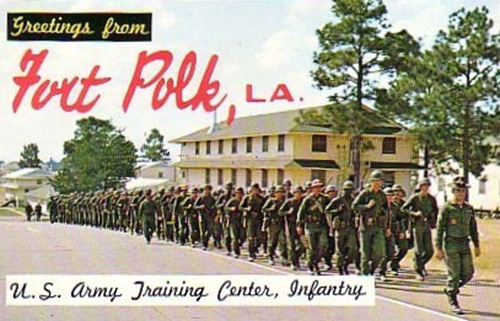
Greetings from Fort Polk
What training modules did you have?
The first one was Basic Training in Fort Polk, Louisiana. The climate there is very similar to that of Vietnam: humidity, heat, swamps, snakes, etc. You were sweating like a pig all the time. When doing a forced march, a jeep was following us towing a trailer full of ice. If someone went down with heat exposure, they were put into it to cool them down. Fortunately, I never needed it. (laughs)
I was slated to go on to Advanced Infantry Training, but something happened. They thought I already had my law degree, so they said I had to wait for my assignment. I was bored, so told them I would like to do something until then. They answered there was a need for truck drivers. I said OK, and it turned out I would have to take a driver test. I was tested in a 10 ton truck, which I never drove before. Finally, my instructor told me to backup between two drums. From up there, I could hardly see anything, so I knocked over one of the drums. The tester just tapped my shoulder and said, you passed. (laughs) We took soldiers on a field exercise to another part of the country. I guess they had no idea that I was such a rookie driver. Later, I was a member of an honor guard at funeral services, as the dead were brought back from Vietnam. It was terrible. Then, I was sent to another base, and I became a clerk at the legal office. I spent ten months there until I received my orders to Vietnam. I got a thirty-day leave, so I went home.
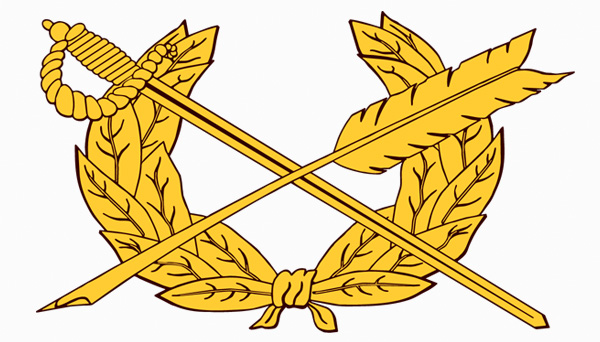
US Army Judge Advocate General’s Corps insignia
Tell me about your first impressions in Vietnam.
The flight took almost 24 hours. We flew from Washington to Hawaii, then to Wake Island, which is nothing more than an airport. We travelled on a civilian plane as the Army did not have sufficient transport capacity. We arrived at night on August 31 in 1970 at Cam Ranh Bay. I remember the day exactly, since everybody aboard was keen to arrive before midnight, as each month spent in a combat zone meant 65 extra dollars, even if you spent only a day there. As we just caught the last hours of August, we were entitled to receive combat pay. Our pilot knew that, and thanks to him, we arrived in time.
So it was night when we got off the plane with our gear. We saw flashes in the distance, but we did not know if it was lightning or artillery fire. Now, I suspect what came afterwards, was a psychological “trick” of the Army. We were herded into a hall and told that we were to brush our teeth with fluoride toothpaste. Everybody was moaning, they did not want to do that, after more than twenty hours of travel. That toothpaste was very unpleasant to use, it burnt our gums. When we were done, they said, sorry, no water for rinsing. (laughs) it is my theory that, this was a psychological maneuver to make us forget about our worries and tension, as all the men started cursing or laughing, so they did not think about those flashes in the distance. Of course, my theory may be false, but what other reasons could be there for all this at two o’clock in the morning?
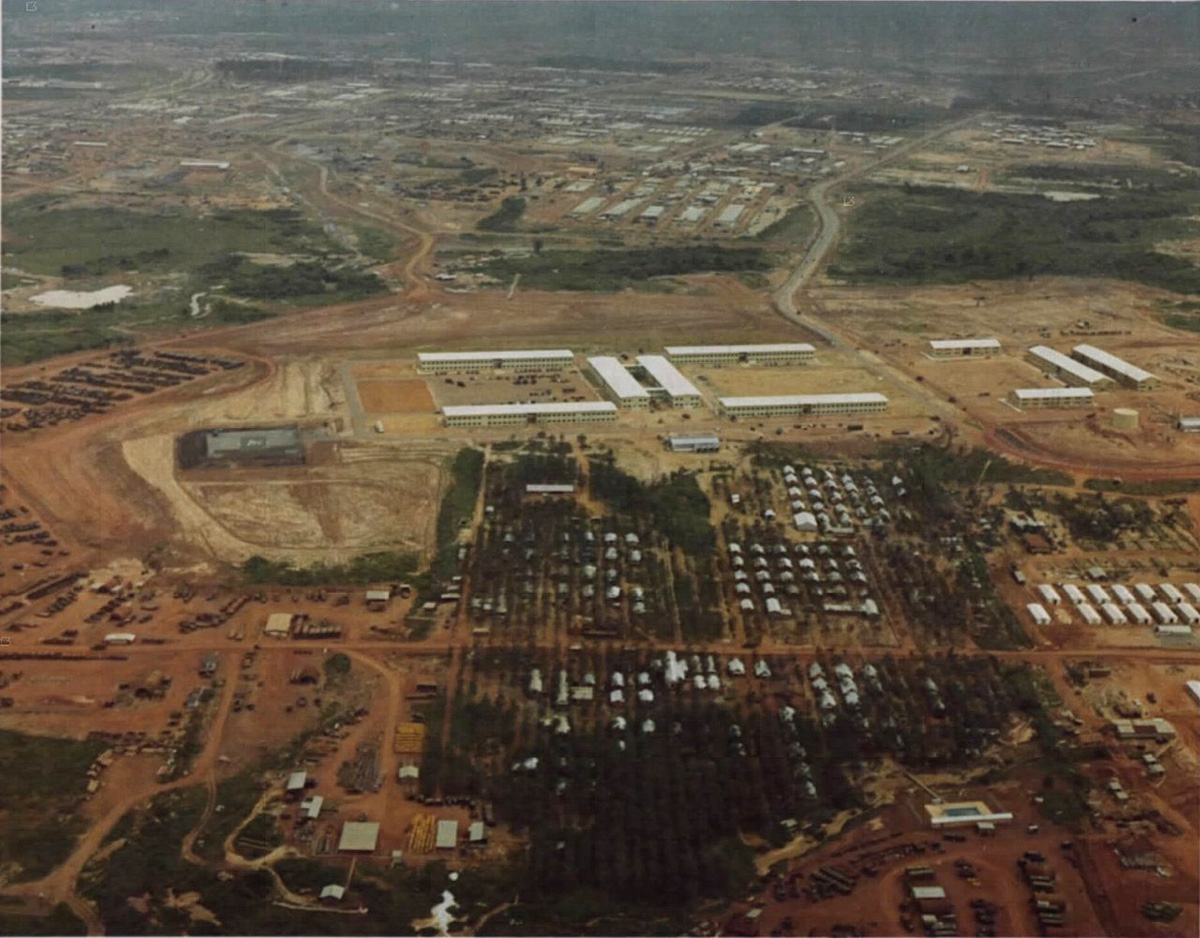
Long Binh post from the air, 1967
What about your assignment?
I was supposed to go to Da Nang near the DMZ, but finally it was Long Binh, with the headquarters of USARV (US Army in Vietnam). I was assigned to the legal office of the 1st Signal Brigade. This unit provided all the communications for our ground troops. I had various tasks. I helped our soldiers write their wills, took part in legal proceedings, but on numerous occasions, we had to investigate certain cases in the field, like accidents, unwarranted use of firearms or suspicious deaths. In other words, it was investigative work. I travelled to a lot of places, including the Mekong Delta, the South China Sea areas and even Thailand.
Tell us about Long Binh. It was a huge basecamp, right?
It was huge, indeed. We were exposed to direct threat only a few times, as the base was surrounded by a fortified perimeter. Sometimes we were attacked with rockets. One particular time the Vietcong tried to dig a tunnel into the base. I remember, it was an evening, we were sitting in front of the wooden barracks, and saw American fighter jets dive bombing. Tunnels had been found on the perimeter, and these planes bombed them. Every now and then I was posted as a sentry there. I had guard duty at the the signal depo alone, but the perimeter was different, we had bunkers there with ammo, grenades, machine-guns, and we were posted in two man teams and had artillery support, if needed.
Life in Long Binh
What was the soldiers’ morale like those days?
We had a lot of junior NCOs – as for me, I was a Sergeant when I left the Army. Many of us had already graduated from college. Grads were common in the headquarters, but there were also many young soldiers. Morale was OK, but of course, everybody awaited DEROS, date eligible to return overseas, to finish their studies or get on with their lives.
Did you meet any Hungarians out there?
Yes, I remember one of them clearly. His family name was Makk, I don’t remember his first name. His circumstances were very similar to mine. Sometimes I went to Saigon with him. We wore American uniforms, but we spoke in Hungarian. The American soldiers were just watching us, asking “who or from where are they?” (laughs) And another story. In the middle of the tour, we went on R&R, a one-week leave. The options were Hawaii, Hong Kong, Thailand and Australia. I went to Sydney. There were locals, who accepted one or two soldiers on leave and showed them the city. Well, I also visited a few bars. I was just sitting there at the counter, next to me a uniformed sailor from the Australian Navy. We had a chat, and we both had an accent, plus we both had our names on our chest, so it turned out that he was Hungarian, too
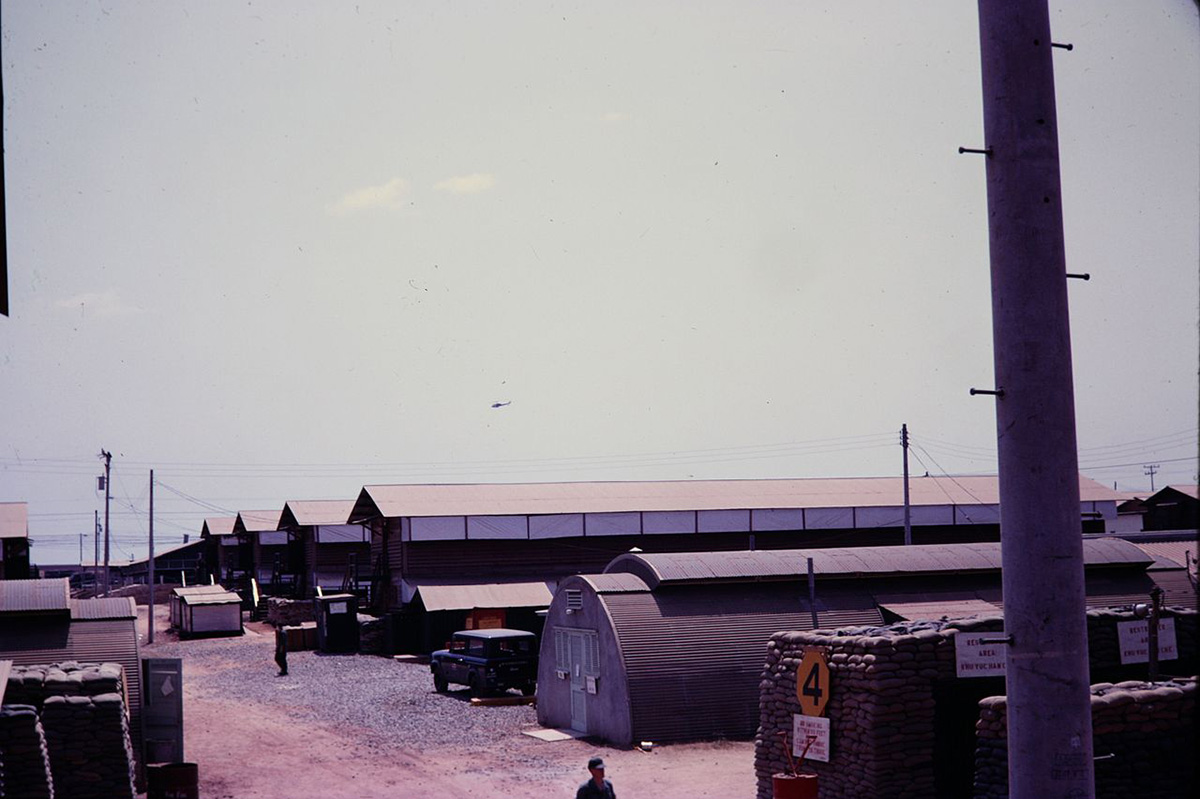
Barracks of the enlisted personnel
When did you return to the US? How difficult was the readjustment?
I spent seven months in Vietnam. I arrived home in late March 1971. It is said, and rightfully, that most soldiers had an awful reception, but it was different for me, and I would not have cared, as I did my duty. I was in the rear echelon, I was not that exposed to enemy activity, I had no traumatic memories like the grunts. What was hard for me when I came back was that, I had only one academic year left, then I had to pass the bar exam. I had studied certain subjects five years earlier, plus I had not even looked into them while in the Army. Which meant the bar exam was a real burden. After that I started working. I was Assistant Attorney General in the Colorado Attorney General’s Office, then spent three years at the Environmental Protection Agency as Assistant Counsel. Between 1975 and 2010, I worked as a lawyer in private practice, We represented companies and towns in environmental and water rights legal proceedings.
What did you feel when the Iron Curtain came down and the Cold War ended?
I was obviously very glad and surprised. I came back to Hungary in June 1989 to see the re-internment of Imre Nagy and his companions. One of my uncles was also reburied. By the way, I had written articles about the Cold War and Communism to local papers on the anniversaries of the Revolution. In high school I gave speeches about these topics. I still have those notecards. In other words, I have been fighting for a long time. (laughs)
In 1994, I was asked to be the Republic of Hungary’s Honorary Consul General for Colorado. It is a position that I accepted on a volunteer basis. I had tasks such receiving Hungarian business and political visitors, dealing with Hungarians in prisons, assisting with passports, and business development. I still am involved in charitable activities. I organize donation shipments to Hungary. For example, I had arranged for the donation and shipment of almost 3000 computers and many shipping containers of used ski clothes.I am currently involved in a project fo the Victims of Communism Foundation, a foundation in Washington D.C. created by the Congress in 1993. We already built a monument for the victims, and a memorial ceremony is held there every year. We are raising money for a museum in Washington to show the sins of Communism and Socialism, so that the younger generations will see the real face of these systems, the crimes they committed and that, they never worked anywhere. Hungary was the first to support this project with a substantial contribution. The money has been accumulating, we already have about 40–50 million dollars. We planned an exhibition for November, but due to the pandemic, it had to be delayed till next May.
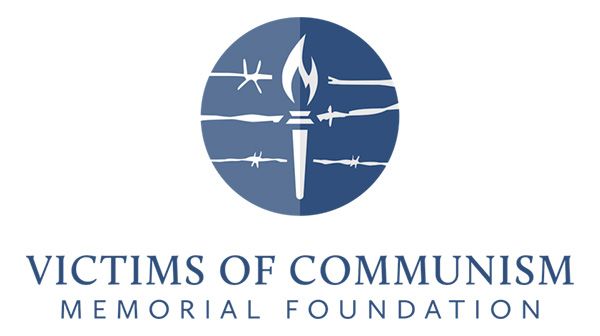
The logo of the foundation
In hindsight, what is your opinion about the Vietnam War and the American involvement?
Back then, after the Revolution and all we went through, I believed that Communism had to be stopped and the US tried to prevent the spread of Communism. America gave us a new home and opportunities, this also meant we had certain duties as citizens, like serving in the military. Even after the war, I felt that the original intention was noble, and the fact that it did not succeed and why not, was another matter. Obviously, the way the war was conducted was an important factor. If the US had committed more troops in 1965, and instead of the gradual escalation, maybe it could have been won.
It was the first war that was seen by millions of Americans on TV every night. Losses were high – it was 4–500 men a week in certain periods. Politically you could not keep that up for ten years, because lots of families were involved, as a large proportion of the combat troops were drafted. Iraq and Afghanistan were different. These days, Vietnam has a really good relationship with the United States.
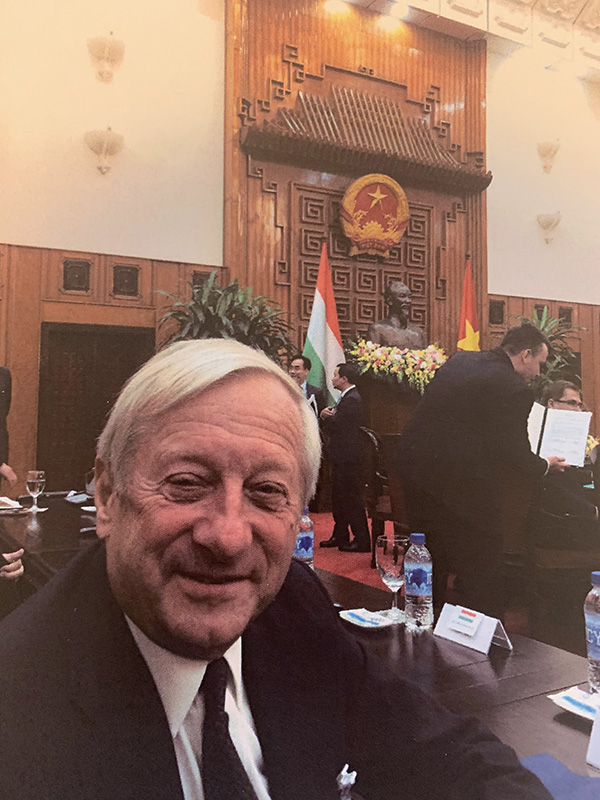
Another trip to Vietnam, but this time as a diplomat
What is your most pleasant memory from the war?
War is not a place for pleasant memories. The best of them… playing cards at night and the discussions with the others in the barracks. We had parties at Thanksgiving, Christmas and New Year’s Eve. Once a fellow was drunk and was playing with his rifle, I had to stop and disarm him.
Sometimes we went out on an investigation by helicopter. Hueys. The pilots were a really brave and tough bunch, but they had their fun with the new guys. If you wore a brand new, dark green uniform, it was obvious to the pilots that, you were new in the country. So we were sitting there on the chopper, and the safety belt was just a strap holding your waist. The door gunners were in place and the pilots did these maneuvers, swirling the bird to make fun of us, looking back at us saying “how you doing, boys?” We of course could not react.
I still am in contact with five of the old fellows, and we meet every five years. Some of them still have old tapes they sent home as audio letters. So we gather and listen to these, we tell the same stories, which are always a bit different, but who cares and we enjoy them?
I had a diary, although that was forbidden, because if it was lost and found by the enemy, it could be a source of information. I used a little notebook. I reread it ten years ago, on the fortieth anniversary, when I went back to Vietnam with my daughter. In Long Binh we took a taxi and went around, but the vegetation and the new buildings made it extremely difficult to find the exact location of the old post. Saigon is a metropolis now. There are elegant European shops and restaurants, but you can also see Ho Chi Minh’s face and the propaganda slogans on the walls. I went to Cu Chi and visited the tunnel museum. Well, that was incredible, as the tunnels are so narrow, you could not turn around in them. And we went to the seashore, as well, and I recognized the Vung Tau beach, where I had been earlier. Now I have two photographs showing me at the same spot forty years apart!
Thank you for the interview.

